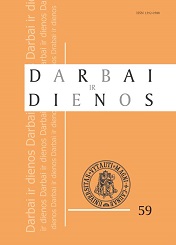Kairysis sąmoningumas ir klasinės sąmonės likimas
Left-wing aw areness and the fate of class consciousness
Author(s): Gintautas MažeikisSubject(s): Cultural Essay, Political Essay, Societal Essay
Published by: Vytauto Didžiojo Universitetas
Keywords: Politinė kairė; politinė dešinė; reformizmas; spektaklio visuomenė; klasinė sąmonė; political left; political right; reformism; the spectacle society; class consciousness; national consciousness; diversity consciousness; reification
Summary/Abstract: Santrauka. Straipsnio tikslas yra aptarti kairiojo sąmoningumo raidą Tarybų Sąjungoje, sovietinėje ir posovietinėje Lietuvoje. Straipsnyje pateikiama kairiojo ir dešiniojo politinio spektro analizė, funkcinio bei biurokratinio požiūrio kritika. Analizuojami V. Lenino samprotavimai apie radikaliojo kairumo ydas, aiškinamos G. Lukacso klasinės sąmonės ir sąmoningumo sudaiktinimo teorijos, nagrinėjamos klasinės sąmonės transformacijos, ypač spektaklio visuomenės laikotarpiu, aptariama kairumo sąsaja su socialinės inžinerijos projektais. Taip pat remiantis V. Kapsuko ir šiuolaikinės Naujosios kairės tekstais kritiškai aiškinama kairumo ir tautiškumo santykio problema, susiję klasinės ir tautinės sąmonės konfliktai ir, kaip išvada, diskutuojama atviros įvairovei sąmonės idėja. The problem of describing the political Left and Leftism is considered on the basis of the history of the origin of the political spectrum from Right to Left and of developing contradictions between functional-reformist, ideological, emblematic-institutional, spectacle, and multiplicity approaches. The functional-reformist standpoint declares the Left is social reformism aiming at equal possibilities, liberties, and diversity. However, the two-dimensional description of the political spectrum is a non-critical following of ideas and ideals and is a consequence of natural sciences at the beginning of the 19th century. The ideological attitude to the problem of the Left presupposes an analysis and critique of differences between class consciousness, false consciousness, and the ideological subject. The ideological or class Left is more philosophical, and many philosophers, poets, artists, and critics developed considerations of it. As important examples, the theory of class consciousness and the reification theories of Gyorgy Lukacs and the Frankfurt School are considered in this article. Lukacs and his followers Adorno, Habermas, and others show the Being of man to be expression of social, productive, cultural, and other relations. The understanding of the human being as resulting from many relations is an ideological theory. So, ideologies are ambiguous: they open the possibility for understanding the truth of Being and Time, or they hide this truth. Class consciousness seeks to unmask the grounding ideologies and criticizes false consciousness: empirical and abstract, or false ideologies. So ideological multiplicity, critical conflict is the normal appearance of the
Journal: Darbai ir dienos
- Issue Year: 2013
- Issue No: 59
- Page Range: 93-117
- Page Count: 25
- Language: Lithuanian

